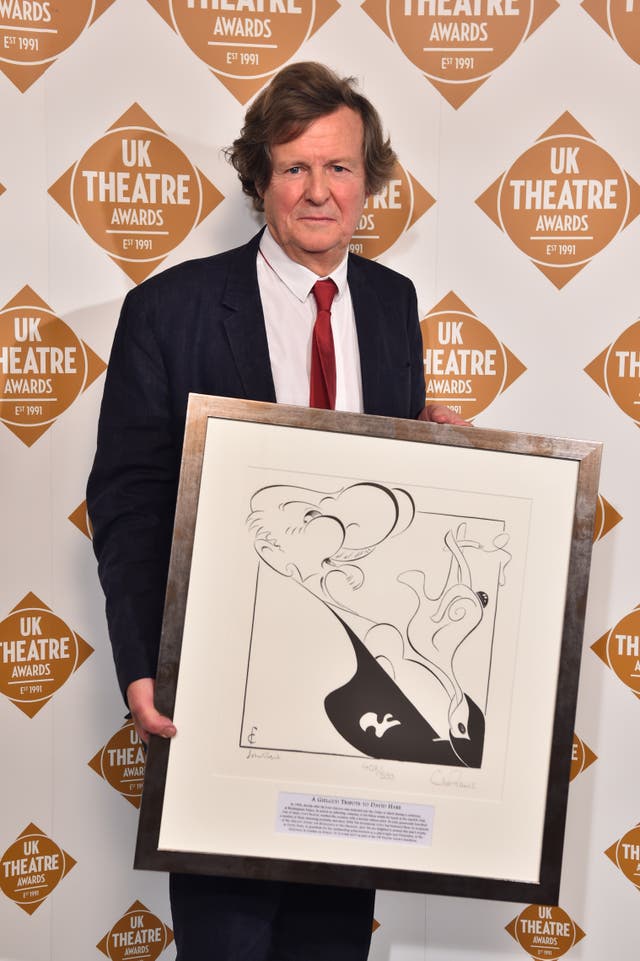National Theatre ‘does not present world’s drama’, says playwright David Hare
The Oscar-nominated writer warned about the survival of the next ‘generation of writers’.

Playwright Sir David Hare has criticised the National Theatre, saying it “is meant to present the world’s drama, and it doesn’t at the moment”, while suggesting that British cultural life is in jeopardy.
The organisation, based on the South Bank, which has staged his newspaper satire Pravda, starring Sir Anthony Hopkins, and his Labour political play I’m Not Running, said its “commitment to writers and new writing is steadfast”.
Sir David, who has also been an associate director of the National Theatre, told BBC Radio 4’s This Cultural Life that he finds it “extraordinary that for 55 years, I’m one of a generation of writers who’ve been able to live and survive in the theatre”.

He added that he feared new writers Beth Steele, who wrote House Of Shades, The Jungle and Kyoto writers Joe Murphy and Joe Robertson would “not be able to sustain that career in the same way that we were able to for as long as we were able to, and once the theatre can’t sustain its living writers, it really is drastically impoverished”.
Sir David called for “subsidy to the regions”, as it was “very hard to present the work you want to present, to risk failure”.
He added: “I have absolutely no right to judge anybody, but I would say that if they believe that a particular writer was the writer who that region should be hearing, or the whole of the country should be hearing, it’s very, very hard for them to back that single writer to the degree which we once backed John Osborne or Edward Bond or Harold Pinter as the voices of their time.
“That kind of backing is what’s missing at the moment. Once that goes, and I would also add once the National Theatre drops repertory, which it appears to have done, you really are eroding the culture in a profound way.
“The National Theatre is meant to present the world’s drama. And it doesn’t at the moment. It does semi-commercial runs, angling for the West End, one play after another. That’s not repertory theatre. That’s not art theatre.”
He added that the idea of the national body – founded in the 1960s with Lord Laurence Olivier as its first director – was inspired by Irish writer George Bernard Shaw, and English actor and writer Harley Granville-Barker’s views of “art theatre”.
A repertory theatre usually uses a company of actors with a rotating series of plays.
A spokesperson for the theatre said: “The National Theatre today stages more new plays and new adaptations than at any point in its history, written by a larger and broader pool of playwrights than ever before, across all three theatres.
“The move to ‘straight runs’ rather than playing in repertory has been a necessary change in the post-Covid financial climate but this has not changed the number of productions staged each year – which has stayed the same.
“In Rufus Norris’ forthcoming final season, four world premieres by playwrights Suzie Miller, Shaan Sahota, David Lan and David Eldridge sit alongside the UK premiere of Stephen Sondheim’s last musical Here We Are, Michael Abbensetts’ Alterations (a seminal work from the Black Plays Archive based at the National Theatre), and three of the NT’s most celebrated productions, Nye, London Road and Dear England, all of which will have the writer in the room and the latter of which won the Olivier Award for Best New Play last year.
“The National Theatre’s commitment to writers and new writing is steadfast.”
Sir David added: “The National now, it generates so few plays.”
“So the days in which you could go and see six plays in a week have gone and I think that’s terrible impoverishment.”
Sir David said the reasons were that the National Theatre “can’t afford to do it anymore”, and said curation of plays needed bringing back as “it’s so important”.

He also said that he never read reviews, and would only produce work if he thought he was “writing the most important film or play of its time”.
Sir David also said: “I turned down a certain number of films and theatre projects on the grounds, you really don’t want me because I will do this very badly, because my heart will not be in it.”
The playwright has written The White Crow, the Ralph Fiennes-directed film about Russian ballet star Rudolf Nureyev’s defection to the West in 1961, BBC Tory minister series Roadkill, and Netflix police series Collateral.
He has been nominated for three Tonys for best play for Racing Demon, Plenty, and Skylight along with winning a TV Bafta for best single play for Licking Hitler in 1979.
He won two Olivier play-of-the-year awards for Racing Demon and Skylight, and picked up the Gielgud Award for excellence in the dramatic arts in 2017.
This Cultural Life is on Thursdays on BBC Radio 4.





